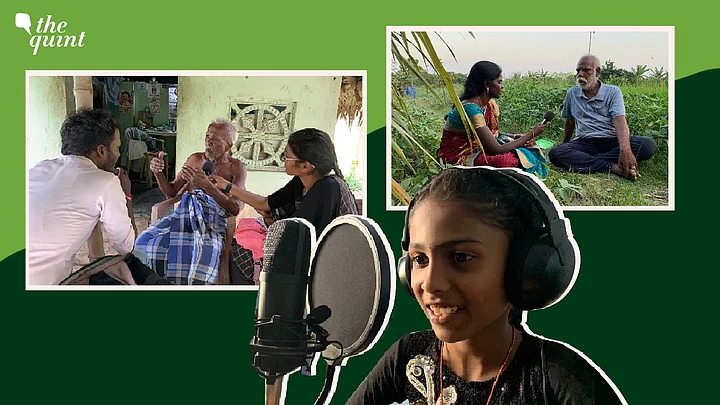When Pavithra, a radio jockey, stepped into the station of Tamil Nadu's first community radio, she was surprised to find that the studio was not air-conditioned and had just one microphone and two chairs.
"We are fighting climate change. So, we practice what we preach. We can eliminate audio in the ambiance in many ways, and polluting the environment need not be the only way," said Project Chief Executive Officer of the radio station, Muthukumarawami.
The radio station, called Kalanjiam Samuga Vanoli, was established fourteen years ago by the Development of Humane Action (DHAN) Foundation in the coastal village of Vizhuthamavadi in Nagapattinam, roughly 320 kilometres to the south of Chennai.
Today, the radio station serves more than 23 villages and covers a 20-km radius; it has helped locals understand the effects of climate change in their daily lives.
Nagapattinam was ravaged by the 2004 tsunami, and since then, the DHAN Foundation has been working with the affected fishing and farming communities along the coast with a long-term development focus.
To complement this initiative, the foundation launched the community radio station in 2008 with a vision of creating a Community Media Centre, combining radio with video and web based technologies. The United Nations Development Programme (UNDP) provided resources under its Tsunami Recovery Support Programme.
Using Age-Old Traditions To Fight Climate Change
Anbarasan, who has been a journalist and an assistant director at Kalanjiam Samuga Vanoli, is the first to arrive at the radio station every day. At 6 am, they start their 12-hour uninterrupted radio session.
The programmes are largely focused on disaster preparedness and recovery in the region, as the district has a history of being vulnerable to extreme weather events due to climate change.
"Who will listen to a radio channel with no music? Well, that is why we play the radio at panchayat meetings. Also, when someone you know is speaking on the radio, then there is a lot of excitement to tune in," said Anbu. They have at least 6,000 regular listeners, and thousands are part of their specific focus groups.
Muthukumaraswami told The Quint, "Earlier, the fisherfolk knew the sea so well – where the boulders were, best catchment areas, which pockets are rough during bad weather. But now, due to frequent cyclones, changing coastlines, and the destruction of mangroves, it has become unpredictable."
He added that the radio programmes offer tips and tricks to combat climate change. "Say, after a cyclone, the fertility of the land dips as it becomes too salty. So, when an irrigation tank is being renovated, the silt is collected and used in the fields, which makes the fields fertile," he said.
The community radio station is built on the principles of democracy – of the people, for the people, and by the people. The four-member crew at the station has at least 25 rural reporter-volunteers, including 13 school-going students, covering issues of climate change and environment.
When asked whether it was difficult to explain climate change to the locals, Muthukumaraswami laughed, saying, "It is a myth that people don't understand climate change. The rural communities are so in sync with today's changing world, and the knowledge they have passed on over generations is what can help us out of this mess."
Climate-Resilient Centres To Be Launched
Most of the programmes comprise conversations on the ground, at grama sabhas, and farmer meetings.
They have introduced specialised mobile applications and WhatsApp groups through which people can send audio recordings with their queries about the effects of the cyclone on the land, how they can restore fertility, crops to be grown as per the changing monsoon schedules. A doctor/expert will respond with solutions. This conversation is then broadcast on radio.
In January, ahead of Pongal (harvest festival in Tamil Nadu), they are planning to launch climate-resilient centres in all the blocks in the district. Each centre will have 25 fishermen who will serve as resource persons; they will maintain a crop diary, closely monitor flood and drought patterns, and refer to ancient methods to devise easy solutions.
The team also ensures that the solutions suggested are being adopted by the locals for environmentally-conscious living. The radio station also played a key role during the coronavirus pandemic – in spreading awareness about the illness and busting myths. It also conducted camps where over 3,600 were administered the COVID vaccine.
(At The Quint, we question everything. Play an active role in shaping our journalism by becoming a member today.)
